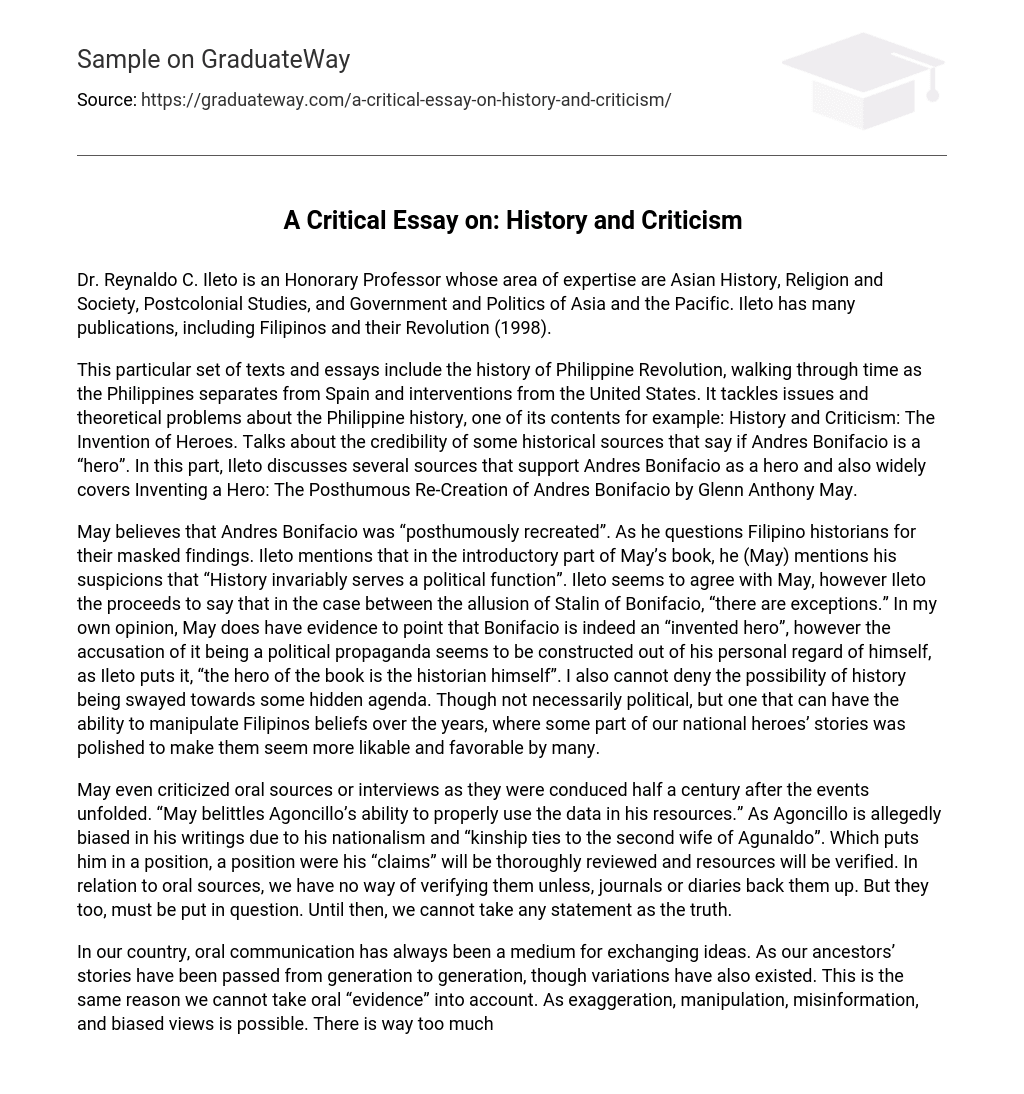Dr. Reynaldo C. Ileto is an Honorary Professor whose area of expertise are Asian History, Religion and Society, Postcolonial Studies, and Government and Politics of Asia and the Pacific. Ileto has many publications, including Filipinos and their Revolution (1998).
This particular set of texts and essays include the history of Philippine Revolution, walking through time as the Philippines separates from Spain and interventions from the United States. It tackles issues and theoretical problems about the Philippine history, one of its contents for example: History and Criticism: The Invention of Heroes. Talks about the credibility of some historical sources that say if Andres Bonifacio is a “hero”. In this part, Ileto discusses several sources that support Andres Bonifacio as a hero and also widely covers Inventing a Hero: The Posthumous Re-Creation of Andres Bonifacio by Glenn Anthony May.
May believes that Andres Bonifacio was “posthumously recreated”. As he questions Filipino historians for their masked findings. Ileto mentions that in the introductory part of May’s book, he (May) mentions his suspicions that “History invariably serves a political function”. Ileto seems to agree with May, however Ileto the proceeds to say that in the case between the allusion of Stalin of Bonifacio, “there are exceptions.” In my own opinion, May does have evidence to point that Bonifacio is indeed an “invented hero”, however the accusation of it being a political propaganda seems to be constructed out of his personal regard of himself, as Ileto puts it, “the hero of the book is the historian himself”. I also cannot deny the possibility of history being swayed towards some hidden agenda. Though not necessarily political, but one that can have the ability to manipulate Filipinos beliefs over the years, where some part of our national heroes’ stories was polished to make them seem more likable and favorable by many.
May even criticized oral sources or interviews as they were conduced half a century after the events unfolded. “May belittles Agoncillo’s ability to properly use the data in his resources.” As Agoncillo is allegedly biased in his writings due to his nationalism and “kinship ties to the second wife of Agunaldo”. Which puts him in a position, a position were his “claims” will be thoroughly reviewed and resources will be verified. In relation to oral sources, we have no way of verifying them unless, journals or diaries back them up. But they too, must be put in question. Until then, we cannot take any statement as the truth.
In our country, oral communication has always been a medium for exchanging ideas. As our ancestors’ stories have been passed from generation to generation, though variations have also existed. This is the same reason we cannot take oral “evidence” into account. As exaggeration, manipulation, misinformation, and biased views is possible. There is way too much risk in trusting “hearsay” as a reliable source of information. There is also the possibility of language barriers within the translation of oral interviews. Ileto doubts that May “could not have in face conducted oral history extensively or effectively”. With this, I believe the barrier between languages affect the context of the story, and some sources may be true. However, in the grounds of historical research, we have to base our “truths” with inanimate evidence. Concrete and straightforward, that contributes to our pursuit of our endless questions about our past.
In line with the topic of sources, we turn to documented sources, text documents, in particular those that pertain to the life Bonifacio lived. May believes that these documents are forged, for example are Bonifacio’s letters, May have reason to believe that penmanship of the letters are different despite the same signatures. He (May) discussed about a hypothetical scenario in which the owner of the letter Epifanio de los Santos knew that the letters were “bogus and wanted to cover up that fact”. Ileto then stresses that May often is not sure of the truth of his allegations as “May uses variations of the word ‘probably’ in his analyses of texts and scenarios”. At this point, I begin to question who to believe in, or what to believe in, it all seems like a grand scheme to manipulate everyone into thinking the belief they have is what’s true. Nevertheless, we must not falter to find the truth.
As May could not find any evidence of forgery in Bonifacio’s letters, he moved to discuss about his personality. Teodoro Agoncillo depicted Andres Bonifacio as “a calm and charismatic leader who inspired his followers to rise revolt”. May counters this with the allegations that Bonifacio was temperamental, claiming that he was “easily offended, a hothead, [and] volatile.”
In an article published by the National Historical Commission of the Philippines in September 5, 2012, Andres Bonifacio having the “optimistic attitude” he showed a “sense of responsibility” and seemed to know how to stand up against prejudice. I disagree with May; I believe Bonifacio only “acted out” whenever he was challenged—as would any of us in the face of a difficult time.
“May’s views about the behavior of nationalist writers and the personality of Bonifacio are fortified by his views about Filipino politicians”. Ileto made a point that all of May’s allegations have been because of his view of “bad guys”. In connection with Bonifacio’s personality and politics, besides the allegation that Bonifacio was an “invented hero” and it was a “political propaganda”, The Tejeros Assembly that happened in 1897 was put into the spotlight as May discredits Artemo Ricarte’s memoir, claiming Ricarte was “whitewashing the truth”. May then moves to claim that during the said election, Bonifacio was not happy and was “a bad loser in a typically rigged election”. According to the National Historical Commission of the Philippines, Bonifacio was a “politically inclined individual”, and according to Santiago Alvarez in 1992, Bonifacio did ask for a recount of votes when the results of the election was released.





